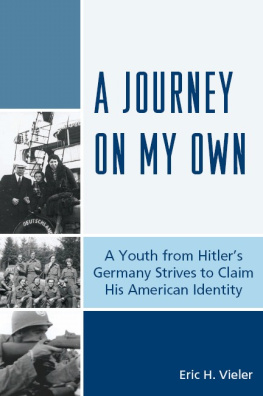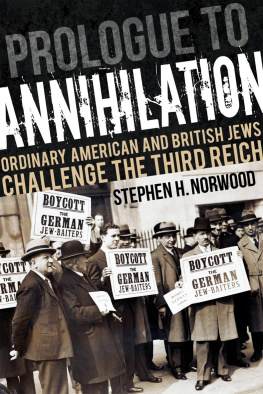About the Author
Eric Vieler chose the US Army as his career in life. As a result, his assignments took him to Korea, Vietnam, Europe and various locations in the United States. In 1952 and 1953 during the Korean War, Vieler, then a young lieutenant in the 7th Infantry Division, was awarded a Silver Star, the third highest decoration for heroism in combat, and a Bronze Star for valor. He was wounded three separate times, the final one almost costing him his life. (His experiences are recounted in Destination EVIL: Remembering the Korean War, published in 2004 by Hamilton Books.)He spent nearly a year receiving extensive medical treatment and to this date still experiences some physical disability. He waived medical retirement to remain on active duty, changing from the physically demanding infantry career to one in military intelligence, where his German language skills and area knowledge proved a distinct advantage.
While in the service, Vieler pursued his formal college education, completing both his bachelors and masters degrees. He also completed studies at the Army Command and General Staff College and the Army War College. Following his retirement he fulfilled his further desire for higher education, earning a doctorate degree in political science. Peter Lang, Inc., published his dissertation, The Ideological Roots of German Nationalism, in 1999.
As an intelligence officer, Vieler was initially assigned to extremely sensitive covert positions. As he advanced in rank, he ultimately commanded major intelligence organizations in Vietnam and the United States. He also served on the Pentagons Army staff and became the principal intelligence officer (G2) of VII Corps in Germany, at the time the Armys largest tactical organization opposing the Soviet threat.
Vielers distinguished military career culminated on a memorable day in August 1976: twenty-six years and one month after he raised his hand to defend the United States against all enemies, he was retired in the grade of Colonel Military Intelligence Branch, US Army. His name appears in both the Infantry School Hall of Fame and the Military Intelligence Corps Hall of Fame.
He often reflects on the decisions that brought him back to America and his chosen career, his combat experiences, and his successes and failures. He lives in San Francisco with his wife Wickie whom he married in 1952. As suggested by the books title, A Journey on My Own, Eric Vieler indeed became a master of his fate. This is his story.
Chapter One
Family Background and Childhood
In 1925 my dad, Erich Vieler, entered the United States by jumping ship. This was not an uncommon practice, sort of a reverse of shanghaiing when able-bodied men were kidnapped, while either drunk or knocked-out, to serve on merchant ships against their will. On the other hand, some seamen, while in a foreign port and given a chance to go ashore, simply failed to return to their ship; they just disappeared. In my dads case, his British-flagged ship arrived at a port in Texas and when the crew was given shore leave the captain said to him, Youre not going to be one of those bastards who wont come back, are you? The captains suspicions were correct; my dad said Auf Wiedersehen to the ship, thereby forfeiting any pay that was due him, and hello to his new home, America. Getting to that decision, however, was not based on some impulse, but on careful calculation. Germany, in the post World War I period, was a mess economically, politically and socially.
When my dad was fifteen, the war was sparked by the assassination of Austrias Archduke Ferdinand in Sarajevo in June 1914. Four years later, Germany was war-weary; it had realized that with the entry of the United States on the side of the Allies, the war could not be won and it sued for peace, even though its military had not been decisively defeated. Some Germans saw the capitulation as a stab in the back by Jews and industrialists. President Woodrow Wilsons Fourteen Points promised a fair peace treaty. A parliamentary democracy and the Weimar Republic were formed to replace the monarchy that had ruled the country.
When the provisions of the Versailles Treaty became known in June 1919, it was clear to the German population that any thought of leniency toward them was extinguished. Large areas of its land were ceded to a reconstituted Poland, its colonies were confiscated, the Allies occupied the Rhineland and the new government was handed a bill of reparation for the cost of the war that it could 1 not possibly pay. In 1922 and 1923, French and Belgian troops occupied the Ruhr area, my dads homeland, to extract goods and material. Germanys response was passive resistance and the unlimited printing of paper money that caused an already existing inflation to skyrocket. Money became worthless and the resulting chaos was fertile ground for the extremists to exploit. Communism, socialism and fascism had been on the rise since the end of the war and now there were attempts by these factions to overthrow the government. One of these was the NSDAP (National Socialist Workers Party), which, under the leadership of Adolf Hitler, tried unsuccessfully to overthrow the Bavarian government in 1923. The party was discredited and Hitler was jailed.
In the early to mid-1920s, it became clear that Germanys experiment with democracy was in shambles: the country was in economic chaos, spiritually humiliated and there was little hope for the future. These conditions motivated people with an independent streak and adventuresome spirit like my dad to seek a better future on the other side of the Atlantic.
My dad was born October 30, 1898, one of nine children. Of seven boys and two girls, seven survived childhood. They were Ernst, Fritz, Paul, Erich (my dad), Heinrich, Lienchen and Willi. The family lived in the small village of Billmerich near the town of Unna, Westphalia, located in the northwestern part of Germany in an area known as the Ruhr district, a major mining and industrial region of Germany. My dads father Heinrich, like his grandfather, was a tailor; his mothers family and ancestors were farmers.
Dad was the fourth oldest; his older sibling Paul, my fathers idol, was charged with looking after my dad, making sure he stayed out of trouble. The eldest brother, Ernst, became the local schoolmaster. A stern individual, he was particularly strict with his siblings who were also his pupils. My dad was physically very strong and athletic, often showing off and amusing the other kids with his acrobatic abilities, such as walking on his hands and doing back flips. At age fifteen he had completed basic schooling and had to choose a vocation, but he didnt want to become a tailor, farmer or coal miner, about the only options open to him in the area; his academic record was not sufficient to follow a teaching profession. Having read and listened to many tales about seafaring, becoming a sailor was appealing. Thus, with his familys blessing and support he traveled to the German port of Kiel on the Baltic Sea and enrolled as a trainee on a school ship, a four-mast sailing vessel. Upon the successful completion of his training he entered service in the German merchant marine as an apprentice seaman. Over the years he became a skilled navigator and a certified ships pilot, while serving on a variety of foreign (British, Scandinavian, Greek) and German vessels, steam and sail, freighters and whaling. The German authorities instituted conscription with the outbreak of World War I, but by signing on a number of different ships my dad kept one step ahead of the induction notice; he thereby survived the war without serving in the German military. His brother Paul volunteered for military service, became an infantry lieutenant, and was killed in one of the fierce battles somewhere in France. His remains were among the thousands that were never recovered. My grandfather made the difficult journey to the area where Paul had been fighting, to try and learn more about his death and locate his remains, but to no avail. Pauls death weighed heavily on my father; they had been close and he talked about him for as long as I can remember. One wonders what Pauls future might have been. At a young age he was a talented artist whose painting of their ancestral home still graces our home. Two other brothers also served in the German military during the war: Ernst, the schoolmaster, became a captain and was seriously wounded in France, and Fritz was drafted into the navy and served on a minesweeper. Heinrich and Willi were too young to serve during World War I.









